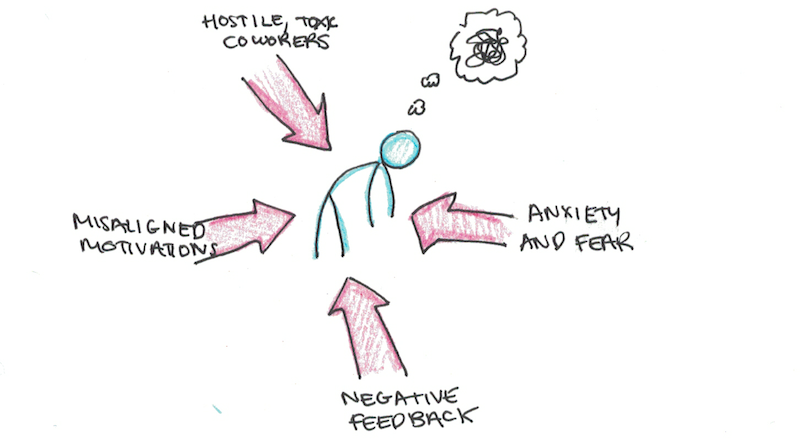Burnout is awful. You feel like a zombie. Motivation is near-zero. Even if you take an night, weekend or several days off, you still feel as exhausted as you did before.
It’s common to blame working too much as the cause of burnout. Psychologist Roy Baumeister, argues that ego depletion, the draining of your ability to make effortful choices over time, is part of the reason why you succumb to temptations. You can only apply effort for so long, and then it’s all used up and you start slacking.
This theory is tempting, but there’s enough counter-examples to make me question it. Given the right environment, many people put in heroic work schedules towards the things they deeply care about.
My own personal experience seems to contradict this. The projects I burned out on weren’t always the ones I put in the most hours on. Sometimes I’ve been burning out while productivity was only a trickle.
Seeing other people burn out in work and school, too, I can’t say that there was a strong correlation between how much work people were putting in and their risk for burnout.
What else could explain it?
Stress, and Negative Emotions Generally, Cause Burnout

Rather than working hours, I believe the main cause of burnout is stress and negative emotions. These can have a few sources:
- Toxic relationships
- Anxiety over future outcomes
- Negative feedback causing aversion to further effort
- Misalignment of deep motivations
Relationships are the most obvious culprit. If your work colleagues are assholes, or you’re stuck in a combative, hostile situation, then even doing a modest amount of work can cause you to burn out.
Anxiety is another powerful cause. If you’re worrying about the outcome of your work, say if you’ll get laid off or fired, or if you’re fearing a specific consequence of it, say dreading standing up on stage to give a presentation on your project, you can start to burn out.
Negative feedback can make it hard to put more effort in. If every time you try something, you get snapped at, belittled or feel humiliated, you’ll quickly develop an aversion to putting in the effort.
Finally your motivations may be misaligned at a deeper level. You’re studying business because your parents told you to, but you really want to be a musician instead, and the tension saps your energy.
How Can You Avoid Stress-Triggered Burnout?
Fundamentally, I think the problem of burnout comes when there is a conditioned aversion to working more. Therefore, the way to avoid it is to try to retrain the conditioning.
Sometimes this can be done at the personal level. If you’re having a lot of anxiety about your performance, this can create a pattern of aversion where you drag your heels because you’re worried about how things will turn out. Sometimes you can fix this by just trying to expose yourself to the thing you’re worried about.
I would often procrastinate when working on a recent book project, because I was worried what I wrote wouldn’t live up to my hopes. I kept imagining criticism or having the book be a failure, and thus killing any possibility I would have of writing another one.
While I can’t actually simulate failure, one trick I used to expose myself was to just try to write lousy version of the chapters. Once I got to writing, the fear started to unwind and I could move forward. If I was sweating over criticism, I showed it to people to solicit criticism privately. Hearing the actual critiques took the force out of my imagination.
Other times, reconditioning yourself won’t be so simple.
What if You Can’t Retrain Your Mind to Avoid Burnout?
If the problem is people, then the hard (but effective) option is simply to not work with hostile, toxic or abusive people. Many people don’t feel they have this option, but the truth is you always do. There are always consequences to not dealing with someone, but you always have a choice to interact with someone or not.
If the problem is misaligned motivations, perhaps you need to change paths? I don’t recommend giving up lightly, but I do think that you need to deeply consider your motivation for pursuing something before going forward.
Burnout From Working Too Much VS From Stress
I think it’s possible to burnout from working too much, but that tends to look a lot different from the kind caused by stress and negative emotions.
The solution to burnout working too much is to just take a break (when possible). Get more sleep. Eat better. Recover your energy.
The solution to burnout from stress has to take into account the reinforced aversion you’ve been building up. If that root cause isn’t dealt with, then it’s usually going to be hard to motivate yourself to get working at it again, even if you’re sleeping enough and have time for a break.


 I'm a Wall Street Journal bestselling author, podcast host, computer programmer and an avid reader. Since 2006, I've published weekly essays on this website to help people like you learn and think better. My work has been featured in The New York Times, BBC, TEDx, Pocket, Business Insider and more. I don't promise I have all the answers, just a place to start.
I'm a Wall Street Journal bestselling author, podcast host, computer programmer and an avid reader. Since 2006, I've published weekly essays on this website to help people like you learn and think better. My work has been featured in The New York Times, BBC, TEDx, Pocket, Business Insider and more. I don't promise I have all the answers, just a place to start.